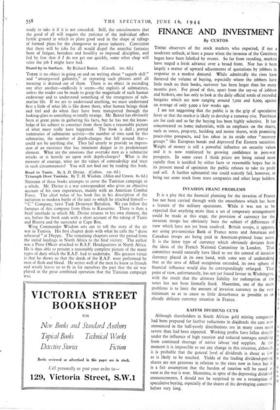FINANCE AND INVESTMENT
By CUSTOS THOSE observers of the stock markets who expected, if not a moderate setback, at least a pause when the invasion of the Continent
began have been falsified by events. So far from receding, markets
have staged a fresh advance over a broad front. Nor has it been largely a matter of upward adjustments of quotations by jobbers in response to a modest demand. While admittedly the rises have
flattered the volume of buying, especially where the jobbers have little stock on their books, turnover has been larger than for many
months past.' For proof of that, apart from the say-so of jobbers and brokers, one has only to look at the daily official totals of recorded bargains which are now ranging around 7,000 and 8,000, against an average of only 5,000 a few weeks ago.
I am not suggesting that the public is in the grip of speculative fever or that the market is likely to develop a runaway rise. Purchases are for cash and so far the buying has been highly selective. It has concentrated on home industrials, with an emphasis on the shares, such as stores, property, building and motor shares, with promising peace-time prospects, and has taken in its stride other " recovery groups " like European bonds and depressed Far Eastern securities. Weight of money is still a powerful influence on security values and it is now reinforced by growing confidence in post-war prospects. In some cases I think prices are being raised more rapidly than is justified by either facts or reasonable hopes but in its present mood of optimism the public refuses to take its profit and sell. A further substantial rise could scarcely fail, however, to bring out some stock from trust companies and other large holders.
INVASION FRANC PROBLEMS
It is a pity that the financial planning for the invasion of France has not been carried through with the smoothness which has been a feature of the military operations. While it was not to be expected that anything more than a set of temporary arrangements could be made at this stage, the provision of currency for the invasion troops has obViously been the subject of differences of view which have not yet been resolved. British troops, it appears, are using pre-armistice Bank of France notes and American and Canadian troops are being paid in American-printed franc notes. It is the latter type of currency which obviously deviates from the ideas of the French National Committee in London. That committee would naturally have liked to see the control of invasion durrency placed in its own hand, with some sort of undertaking that as' the area of Allied occupation extended, its own sphere of financial influence would also be correspondingly enlarged. That point of view, unfortunately, has not yet found favour in Washington, with the result that the ultimate liability for redemption of the notes has not been formally fixed. Meantime, one of the main problems is to limit the amount of invasion currency to the very minimum so as to cause as little disturbance as possible to an already delicate currency situation in France.
KAFFIR DIVIDEND CUTS
Although shareholders in South African gold mining companies had been prepared for further reductions in dixidends the cuts now announced in the half-yearly distributions are in many cases more severe than had been expected. Working profits have fallen sharply under the influence of high taxation and reduced tonnages resulting from continued shortage of native labour and supplies. At the moment it is impossible to see any change in this situation, although it is probable that the general level of dividends is about as low as is likely to be touched. Yields of the leading dividend-paying shares are not generous in relation to the rates now in force but it is a fair assumption that the burden of taxation will be eased as soon as the war is won. Meantime, in spite of the depressing diiidend announcements, I should not be surprised to see a resumption of speculative buying, especially of the shares of the developing concerns, before very long.


























 Previous page
Previous page